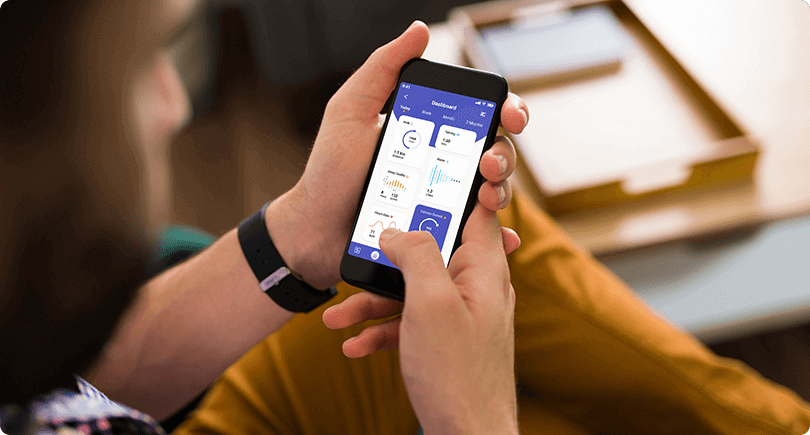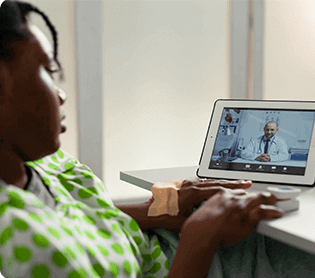There is no surprise that gaming has found its way into healthcare. However, gaming does not bring entertainment; it transforms how patients engage with their health. Gaming has emerged as a powerful tool that improves patient outcomes, turns treatments into enjoyment, and empowers people to stick with their health plans. Imagine handling chronic pain with a game to distract and empower you or using virtual reality to motivate physical therapy exercises. Let’s explore how gaming reshapes healthcare, from enhancing patient engagement to overall health outcomes.
Evolution of Gaming in Healthcare
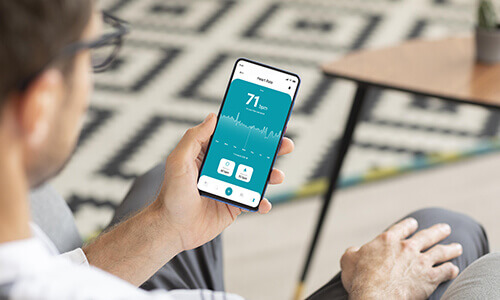
The integration of gaming into healthcare began with simple, educational games designed to help patients understand their conditions. These early games were more about education than treatment, aimed at children with chronic illnesses like asthma or diabetes. As technology advanced, so did the applications of gamification in healthcare. The healthcare software development of more sophisticated software, the rise of mobile gaming, and the advent of virtual and augmented reality have opened new doors.
Gamification in healthcare is about more than just education. It’s about motivation, engagement, and real-time feedback to patients and healthcare providers. The possibilities are endless, whether using a VR headset to distract from pain during a procedure or gamified healthcare apps that turn medication adherence into a game with rewards.
How Gaming Enhances Patient Engagement?
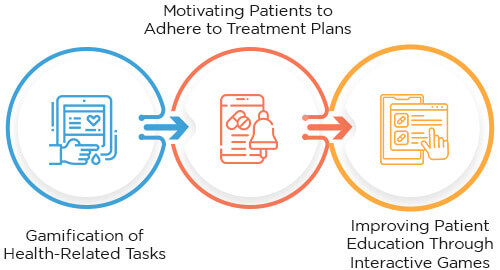
Patient engagement is critical to successful healthcare outcomes. When patients are actively involved in their care management, they are more likely to follow through with treatment plans and experience better results. Gaming has emerged as an innovative way to boost this engagement.
1. Gamification of Health-Related Tasks
One of the most significant ways gaming enhances patient engagement solutions is through the custom healthcare gamification development of routine health tasks. Imagine a patient with diabetes who needs to monitor their blood sugar levels regularly. Turning this routine task into a game where they earn points for consistently monitoring and maintaining healthy levels makes the patient more likely to stay engaged and take their health seriously. The game could include challenges, rewards, and social sharing options to keep the patient motivated and involved.
2. Motivating Patients to Adhere to Treatment Plans
Treatment adherence is a common challenge in healthcare, especially for chronic conditions. Gaming can turn adherence into a fun, rewarding experience. For example, a game might encourage patients to take their medication on time, log their daily health activities, or stick to a rehabilitation program. By earning rewards, unlocking new levels, or competing with others, patients are more likely to stay committed to their treatment plans.
3. Improving Patient Education Through Interactive Games
Understanding a health condition or the importance of a treatment plan can be daunting for many patients. Interactive games simplify complex information and present it in a way that’s easy to understand and retain. For example, a game might explain how a particular medication works in the body, what side effects to watch for, or why a specific lifestyle change is crucial for managing a condition. These educational games empower patients with knowledge, making them more informed and engaged in their care.
Gaming for Mental Health and Wellbeing
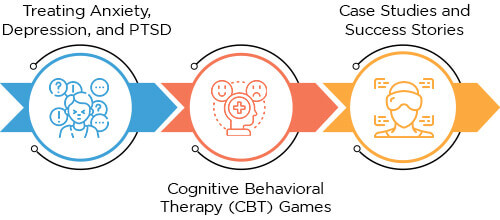
Gaming is making significant strides in mental health app development. Traditional therapy methods can be challenging for some patients, who may find it difficult to open up or engage fully in treatment. Gaming offers a new approach, providing a safe, controlled environment where patients can work through their mental health challenges.
1. Treating Anxiety, Depression, and PTSD
Games designed to help with anxiety, depression, and PTSD create immersive experiences where patients can confront their issues in a controlled setting. For example, a game might guide patients through breathing exercises, mindfulness practices, or scenarios that help them face and manage their fears. These games can be used alongside traditional therapy or as a standalone treatment, offering patients a new way to engage with their mental health.
2. Cognitive Behavioral Therapy (CBT) Games
Cognitive Behavioral Therapy (CBT) is a well-established method for treating various mental health conditions. CBT games take this therapy into the digital world, providing interactive experiences that help patients identify negative thought patterns and learn how to change them. These games often include scenarios that challenge players to think differently, offering immediate feedback and progress tracking, which can motivate patients.
3. Case Studies and Success Stories
There are numerous success stories where gaming has made a significant difference in mental health treatment. For instance, veterans who have PTSD have used VR games to safely revisit and process traumatic experiences, leading to substantial improvements in their symptoms. Similarly, people with anxiety have found relief through games that teach relaxation techniques and provide exposure therapy in a virtual setting.
Physical Rehabilitation and Recovery
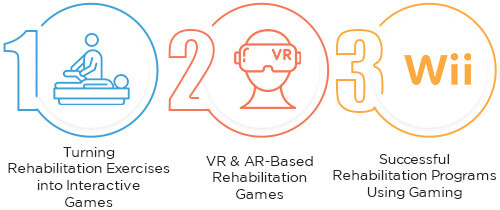
Physical rehabilitation can be a long, arduous process. Patients recovering from surgeries, injuries, or neurological conditions often face repetitive exercises that can be boring and demotivating. Gaming is changing this by making rehabilitation more engaging and effective.
1. Turning Rehabilitation Exercises into Interactive Games
Consistency is crucial to recovery in rehabilitation. However, the repetitive nature of many exercises can lead to boredom and frustration. Patients are more likely to stick with their rehabilitation program by turning these exercises into interactive games. For example, a game might involve a patient using a motion-sensing device to guide a character through obstacles, mirroring their physical therapy exercises. This makes the process more enjoyable and helps track progress in real-time.
2. VR and AR-Based Rehabilitation Games
Virtual and Augmented Reality are revolutionizing physical therapy. Patients can immerse themselves in a virtual world where their therapy exercises are part of a game. For example, a patient recovering from a stroke might use a VR headset to practice arm movements by reaching out to grab virtual objects. These experiences are more engaging than traditional exercises and can lead to better outcomes by encouraging patients to push themselves further in a safe environment.
3. Successful Rehabilitation Programs Using Gaming
Several rehabilitation programs have successfully integrated gaming to improve outcomes. For instance, using the Nintendo Wii in physical therapy has shown positive results, particularly in improving balance and coordination. Similarly, VR games have been used to help patients with spinal cord injuries regain mobility by simulating real-world activities in a controlled environment.
Improving Chronic Disease Management
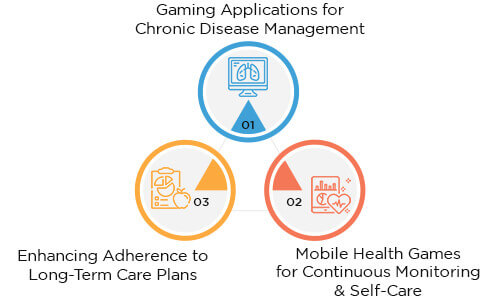
Chronic diseases like diabetes, COPD, and heart disease require ongoing care and lifestyle adjustments. Gaming provides innovative solutions to help patients manage their conditions more effectively.
1. Gaming Applications for Chronic Disease Management
Custom healthcare gamification services for chronic disease management often focus on education, monitoring, and lifestyle changes. For example, a game for diabetes management might help patients track their blood sugar levels, encourage healthy eating habits, and provide medication reminders. These games are designed to be informative and motivating, helping patients stay on top of their health.
2. Mobile Health Games for Continuous Monitoring and Self-Care
Mobile games have become a popular tool for continuous monitoring and self-care. These games can be linked to wearable devices that track vital signs, providing real-time feedback and alerts when something is amiss. For instance, a game might notify patients with COPD if their oxygen levels drop, prompting them to take action before the situation worsens.
3. Enhancing Adherence to Long-Term Care Plans
Long-term care plans can be challenging, especially when the benefits aren’t immediately apparent. Gaming can enhance adherence by providing daily challenges, rewards, and social support. For example, a game might offer points for completing daily exercises, logging food intake, or attending doctor appointments. These incentives can help keep patients motivated and committed to their care plan.
Challenges and Ethical Consideration
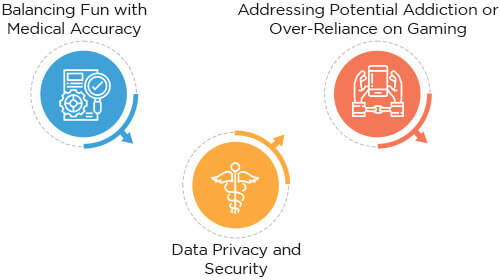
While gamification in healthcare development offers many benefits, it’s not without challenges and ethical considerations.
1. Balancing Fun with Medical Accuracy
One key challenge is ensuring that games are both fun and medically accurate. If a game is too focused on entertainment, it might lose its educational or therapeutic value. On the other hand, if it’s too focused on the medical aspect, it might not be engaging enough to keep patients interested. Striking the right balance is crucial.
2. Data Privacy and Security
Healthcare games often collect sensitive user data, such as health metrics and personal information. Ensuring this data is securely stored and handled is essential to maintaining patient trust. Developers must comply with regulations like HIPAA and prioritize user privacy in designing and implementing these games.
3. Addressing Potential Addiction or Over-Reliance on Gaming
While gaming can be a powerful tool for improving health, there’s also the risk of addiction or over-reliance on gaming for motivation. Patients might become too dependent on games to manage their health, neglecting other important aspects of their treatment. It’s essential to use gaming as a complement to, rather than a replacement for, traditional healthcare methods.
Future Trends in Healthcare Gaming
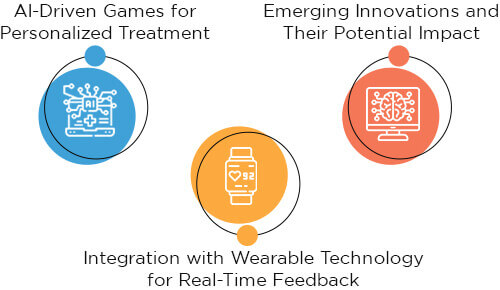
The future of gamification in healthcare is bright, with new technologies and applications constantly emerging.
1. AI-Driven Games for Personalized Treatment
Artificial Intelligence is poised to take healthcare gaming to the next level by offering personalized treatment options. AI-driven games can adapt to a patient’s specific needs, providing customized challenges and feedback that evolve as the patient progresses. This level of personalization can lead to more effective treatments and better outcomes.
2. Integration with Wearable Technology for Real-Time Feedback
Wearable technology is already making waves in healthcare management, and its integration with gaming is the next logical step. Games that sync with wearable devices can offer real-time feedback, adjusting challenges based on the patient’s condition. For example, a fitness game might increase the intensity of a workout if the patient’s heart rate is in the optimal zone.
3. Emerging Innovations and Their Potential Impact
Innovations like augmented reality glasses, brain-computer interfaces, and virtual support groups are just the tip of the iceberg. As these technologies become more advanced and accessible, we expect even more exciting developments in healthcare gaming. These innovations can make healthcare more interactive, personalized, and effective.
Conclusion
Gaming in healthcare is more than a passing trend-it’s a transformative tool that enhances patient engagement and improves health outcomes. From motivating patients to adhere to treatment plans to providing innovative solutions for chronic disease management, gaming is changing how we think about healthcare. As technology continues to evolve, the possibilities of healthcare gaming are endless. It’s an exciting time for patients and healthcare providers alike, and the future of healthcare gaming holds even more promise. Whether you’re a patient looking for a more engaging way to manage your health or a healthcare provider seeking new ways to improve patient care, gaming offers opportunities.
OSP is a trusted healthcare software development company that delivers bespoke solutions as per your business needs. Connect with us to hire the best talents in the industry to build enterprise-grade software.

How can we help?
Fill out the short form below or call us at (888) 846-5382
Discuss Your Project Handover with a team of expert Book a free consultation arrow_forward
About Author

Written by Riken Shah linkedin
Riken's work motto is to help healthcare providers use technological advancements to make healthcare easily accessible to all stakeholders, from providers to patients. Under his leadership and guidance, OSP Labs has successfully developed over 600 customized software solutions for 200+ healthcare clients across continents.







